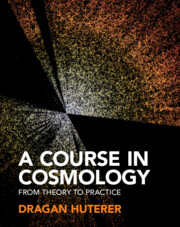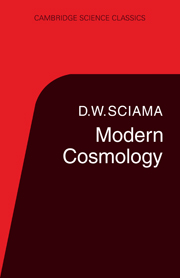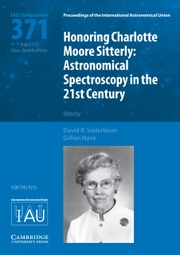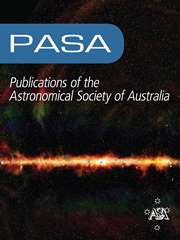A Course in Cosmology
This new graduate textbook adopts a pedagogical approach to contemporary cosmology that enables readers to build an intuitive understanding of theory and data, and of how they interact, which is where the greatest advances in the field are currently being made. Using analogies, intuitive explanations of complex topics, worked examples and computational problems, the book begins with the physics of the early universe, and goes on to cover key concepts such as inflation, dark matter and dark energy, large‑scale structure, and cosmic microwave background. Computational and data analysis techniques, and statistics, are integrated throughout the text, particularly in the chapters on late-universe cosmology, while another chapter is entirely devoted to the basics of statistical methods. A solutions manual for end-of-chapter problems is available to instructors, and suggested syllabi, based on different course lengths and emphasis, can be found in the Preface. Online computer code and datasets enhance the student learning experience.
- Computationally oriented with integrated coverage of data-analysis topics and dedicated computational problems, ensuring students are familiar with numerical techniques
- Pedagogical approach with boxed worked examples helps students better understand complex topics and crucial points
- Advanced material is separated from the rest of the text, offering instructors the flexibility to incorporate topics as relevant to their course
- Intermediate coverage at the lower-graduate level fills a gap in a market which offers a number of textbooks that are either introductory, or highly specialised
Reviews & endorsements
'An incredibly practical approach to introducing pivotal concepts in cosmology, with a preciously rare focus on preparing its readers to engage with the science of cosmology in a real-life manner.' Vera Gluscevic, University of Southern California
'This superb first introduction to cosmology for advanced undergraduate or graduate students is sure to inspire and teach young inquisitive minds for years to come. Huterer weaves the history of the field with elegant and lucid explanations of the most salient topics in modern cosmology.' Balša Terzić, Old Dominion University
'This is a welcome addition to the growing number of textbooks on cosmology. The subject is concisely but exceptionally clearly presented, suitable for a one-semester course. The book stands out by covering the full range of material needed for a beginning graduate student contemplating entering research in cosmology: from the foundations all the way to active research topics, such as neutrinos, dark energy, modern large-scale structure and cosmic microwave background experiments, as well as analysis techniques. I am looking forward to adopting this book for my own cosmology course.' Zoltan Haiman, Columbia University
'A clearly written introduction to astrophysical cosmology emphasizing data/theory connections. This text is unique in introducing the relevant techniques for those new to the field.' Curtis Struck, Iowa State University
'A complete guide to form the next generation of well-rounded cosmologists. This book is a unique combination of theoretical, observational, and statistical aspects, with pedagogical and extensive descriptions of modern statistical methods in cosmology.' Alessandra Silvestri, Leiden University
Product details
March 2023Hardback
9781316513590
436 pages
260 × 209 × 25 mm
1.24kg
Available
Table of Contents
- Preface
- Acknowledgments
- Part I. Foundations:
- 1. Introduction to cosmology
- 2. The Hubble law and geometry of space
- 3. Contents of the universe
- Part II. The Early Universe:
- 4. Early-universe thermodynamics
- 5. Neutrinos in cosmology
- 6. The Boltzmann equation and baryogenesis
- 7. Big Bang nucleosynthesis
- 8. Inflation
- Part III. The Later Universe:
- 9. Large-scale structure in the universe
- 10. Statistical methods in cosmology and astrophysics
- 11. Dark matter
- 12. Dark energy
- 13. Cosmic microwave background
- 14. Gravitation lensing
- Appendices
- References
- Index.





